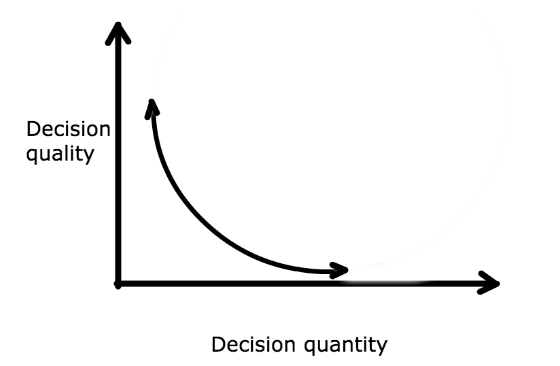
In our last blog, we talked about the power and importance of establishing positive routines in our daily lives. Today, we are going to talk more about why it’s so crucial to establish these routines, and it might be something that you haven’t thought about.
The thing about routines is that they cut down on the number of decisions you have to make each day. That’s important.
Believe it or not, we all have a certain number of decisions we can make before we deplete our decision-making capacity. It’s called “decision fatigue,” and it can affect us all. Decision fatigue is the deterioration of our ability to make good and sound decisions after a prolonged session of decision-making (or simply at the end of a long, stressful day at work).
Simply put: The more decisions you make, the less likely you are to make the correct or good decision. That’s where the fatigue factor comes in. Many of you have seen a quarterback, late in the game or in overtime, make a poor decision due to fatigue. Chances are, he’s not just physically tired; he’s also mentally tired experiencing decision fatigue.
Decision fatigue can deplete your focus and energy and motivation and willpower. And that limits your success.
So how do you avoid decision fatigue? These tips can help:
- Simplify your choices throughout the day by establishing solid routines. Steve Jobs was famous for reducing his wardrobe to just a few outfits in order to limit the number of decisions he had to make every day. Mark Zuckerberg follows this same everyday routine.
- Prioritize your day. Do the most important things first. Your best time for hard decisions is at the beginning of your day. Make this part of your routine, and enjoy the structure it brings.
- Use momentum to your advantage. Studies show that once you start a task, you’ll be more likely to finish it. Ernest Hemingway would end his writing day mid-sentence, therefore setting himself up to start (and start with momentum) the next day. A routine can help you avoid procrastinating.
- Take time out. If you’re feeling decision fatigue, take a walk around the block. Better yet, take a short nap. Science tells us that when we sleep, the brain makes room for new information. That new information might be just what you need to jumpstart your decision-making process.
If you’d like more info about how to overcome decision fatigue, check out Nicole Coomber’s YouTube video: https://youtu.be/NFsVqFF0gTc.
Bottom line: Don’t make major and important decisions when you are low on mental energy. You likely will either make a reckless decision or decide to do nothing at all. Both are bad decisions. Let time be your friend, and wait to decide on the best action to take when you are fresh and your willpower is strong. Establish good daily routines so you make fewer decisions in the first place. Do that, and you’ll do what you do better.